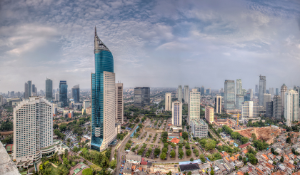Jakarta Globe reported that, in 2020, Indonesia for the first time became an Upper-Middle Income...
Why Indonesia Is Moving Its Capital
In 2019, Indonesian President Joko Widodo announced plans to relocate the Indonesian capital from Jakarta to a new, purpose-built capital city on the island of Borneo named “Nusantara.” The planned relocation is predicted to cost USD 32.7 billion according to the Guardian.
19% of the costs will be directly covered by state funds with remaining costs covered by private investments and public-private partnerships. In today’s article, we will be exploring the different reasons behind the relocation.
Mainly, the deteriorating environmental conditions in Jakarta and the desire to move away from Java-centric national development. Thereafter we will discuss concerns pertaining to the relocation and examples of other countries that have relocated their capital cities.
.png?width=870&name=Untitled%20design%20(1).png)
Deteriorating Environmental Conditions in Jakarta
Jakarta is sinking. According to the BBC, “North Jakarta has sunk 2.5m in 10 years and is continuing to sink by as much as 25cm a year in some parts, which is more than double the global average for coastal megacities… Jakarta is sinking by an average of 1-15cm a year and almost half the city now sits below sea level.”
Jakarta’s sinking can be attributed to the city’s inability to pipe in sufficient clean water for basic everyday use, forcing Jakartans to pump their own water from shallow, underground aquifers. According to a different article from the BBC, water management authorities are only able to supply 40% of Jakartan’s water needs.
As a result, the land above collapses due to sudden disappearances of bodies of water below, writes the Guardian. This situation is further exacerbated by lax regulations surrounding groundwater extractions and not helped by the 32km outer sea wall being built across Jakarta Bay along with 17 artificial islands aimed at fending off rising sea water.
Moving Away from Java-Centric National Development
At the same time, President Widodo is looking to ease the economic inequality between Java, where Jakarta is located, and the rest of the country. For perspective, the World Economic Forum states 60% of Indonesia’s 260 million population reside in Java. Consequently, most if not all major economic activities including infrastructure projects take place on the island of Java.
President Widodo’s decision to move the capital outside of Java is arguably a signal that he aims to reorient national development away from Java towards a more comprehensive and regionally inclusive national development plan, writes the Diplomat. The relocation is expected to serve as a means to inject investment into the region considering the USD 32.7 billion relocation costs.
Moreover, Nikkei reports that, at least prior to the pandemic, the relocation has already attracted major foreign investors such as SoftBank CEO Masayoshi Son, former British Prime Minister Tony Blair, and Abu Dhabi Crown Prince Mohammed bin Zayed Al Nahyan. Evidently, the aim is to stimulate the Indonesian economy as a whole by building up more isolated parts of the country.
Concerns Surrounding the Relocation
The biggest concern surrounding the relocation centres around the costs of the relocation, especially considering the ongoing COVID-19 pandemic, the rising GDP-to-debt ratio (approximately 41% this fiscal year), declining national tax revenues, and worsening fiscal deficits, writes Nikkei.
Critics such as Fitch Solutions thus believe the government will struggle to attract the necessary funds to finance the relocation, especially considering declining global business confidence levels. Moreover, other critics are concerned about the environmental impact that the relocation may have.
“[Environmentalists] fear the move will hasten the destruction of forests that are home to orangutans, sun bears and long-nosed monkeys, as well as increasing pollution already on the rise from coal mining and palm oil industries,” states Al-Jazeera.
Other Countries that Have Relocated their Capital Cities
Indonesia is not the only Southeast Asian country to relocate its capital. Myanmar relocated its capital in 2005 from Yangon to Naypyidaw. “Former military leader Than Shwe pitched the move as a plan to avoid traffic and urban density, but analysts characterized it as an attempt to shield the seat of power from the possibility of protest or popular uprising,” reports the Washington Post.
According to CNA, Malaysia moved its seat of government to Putrajaya in 1999, though Kuala Lumpur remains its national capital. Remaining in Asia, Pakistan relocated its capital from Karachi to the purpose-built city of Islamabad in the 1960s whereas Australia created its capital Canberra in the 1920s as a compromise to Sidney and Melbourne.
On the other hand, Nigeria relocated its capital from Lagos to Abuja for similar reasons to Indonesia: Abuja’s central location and Lagos’ excessive congestion. Brazil, relocated its capital from Rio de Janeira to Brasilia in 1960, has had its capital designated a UNESCO World Heritage Site in 1987.
In Conclusion
The deteriorating environmental conditions in Jakarta and a push towards more geographically inclusive national development have led the Indonesian government to relocate its capital to Borneo. However, there are financial and environmental concerns surrounding the relocation, despite there is historical precedent of other countries having relocated their capital cities in the past.
-1.jpg?width=146&height=50&name=Kusu%20(1)-1.jpg)




